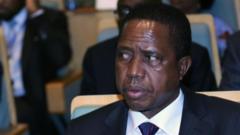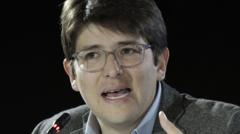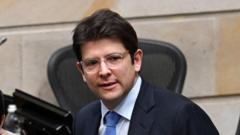In Poland, the upcoming presidential election on Sunday has emerged as a fierce contest between Warsaw's liberal mayor Rafal Trzaskowski and conservative historian Karol Nawrocki. Both candidates are virtually tied in the polls, highlighting the fragmented political landscape that could determine Poland's approach to European Union relations and domestic policies.
Poland's Presidential Election: A Divisive Contest Between Liberals and Conservatives

Poland's Presidential Election: A Divisive Contest Between Liberals and Conservatives
As Poland heads into a critical presidential election, competing ideologies could reshape the nation's future.
Despite the largely ceremonial nature of the presidency, it carries considerable power, notably the ability to veto legislation. The current coalition government, led by Donald Tusk, is navigating a precarious parliamentary majority, complicating its ability to enact reform. This backdrop creates significant stakes for both candidates: a victory for Nawrocki would likely mean intensified vetoes against Tusk’s administration, while a win for Trzaskowski might foster more progressive reforms within EU frameworks.
Nawrocki, head of the Institute of National Remembrance, is positioned as a defender of conservative values and traditional family structures, gaining support from rural demographics. His campaign is set against the backdrop of increased nationalistic sentiments, evidenced by strong turnout at rallies that underscore his appeal to patriotic voters. However, Nawrocki's campaign faces scrutiny from allegations regarding his past, including controversial associations and behaviors. Nevertheless, his base views him as a resilient leader, brandishing imagery of strength to draw parallels with global figures like Donald Trump.
On the other side, Trzaskowski has presented himself as a champion of liberal, pro-European ideals, reinforced by his background as an articulate politician and former minister. He rallies support from an urban, younger demographic advocating for social progress, including rights for LGBT individuals and migrants. As Poland grapples with the challenges of war in Ukraine and emerging social issues, Trzaskowski's vision seeks to anchor the country firmly within EU structures, emphasizing partnerships forged through historical lessons.
As polls close and the dust settles, voter mobilization will be key to deciding the future of Poland’s leadership. The candidates’ stark contrasts reflect not only personal ideologies but broader cultural divides that will undoubtedly influence the societal fabric of the nation for years to come.
Nawrocki, head of the Institute of National Remembrance, is positioned as a defender of conservative values and traditional family structures, gaining support from rural demographics. His campaign is set against the backdrop of increased nationalistic sentiments, evidenced by strong turnout at rallies that underscore his appeal to patriotic voters. However, Nawrocki's campaign faces scrutiny from allegations regarding his past, including controversial associations and behaviors. Nevertheless, his base views him as a resilient leader, brandishing imagery of strength to draw parallels with global figures like Donald Trump.
On the other side, Trzaskowski has presented himself as a champion of liberal, pro-European ideals, reinforced by his background as an articulate politician and former minister. He rallies support from an urban, younger demographic advocating for social progress, including rights for LGBT individuals and migrants. As Poland grapples with the challenges of war in Ukraine and emerging social issues, Trzaskowski's vision seeks to anchor the country firmly within EU structures, emphasizing partnerships forged through historical lessons.
As polls close and the dust settles, voter mobilization will be key to deciding the future of Poland’s leadership. The candidates’ stark contrasts reflect not only personal ideologies but broader cultural divides that will undoubtedly influence the societal fabric of the nation for years to come.





















